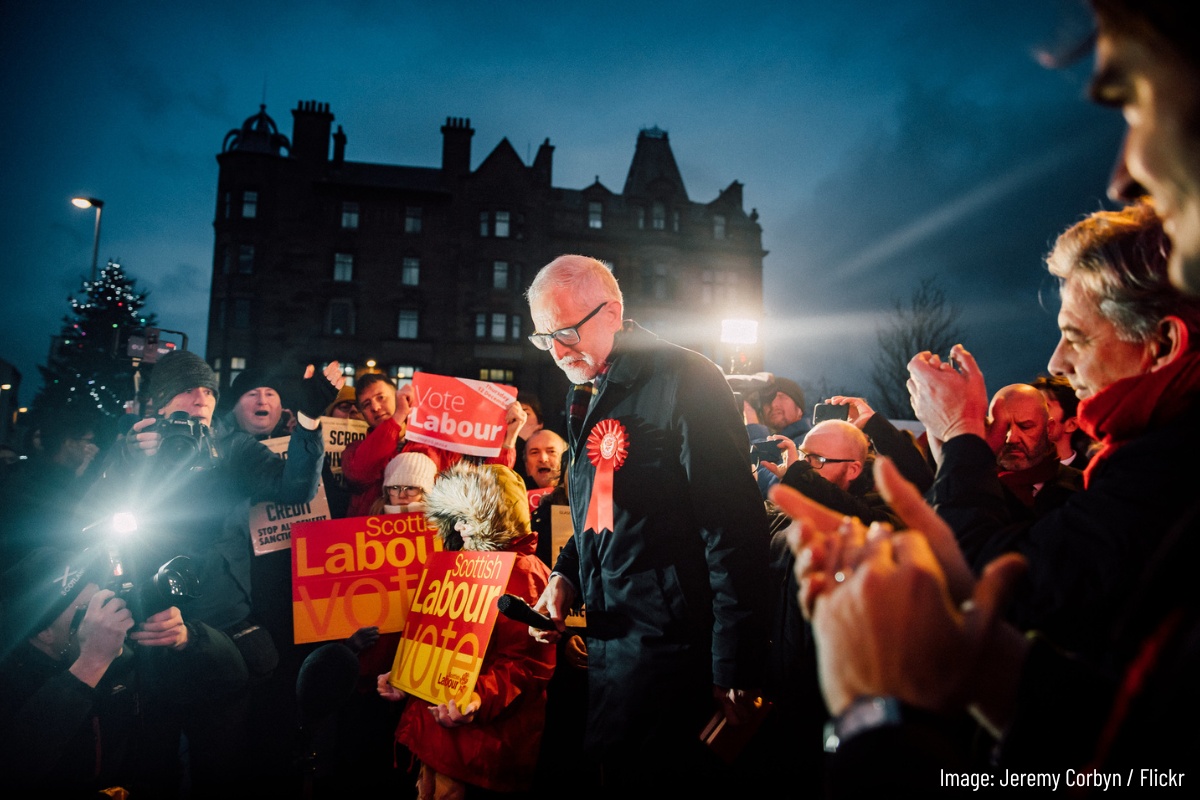Ten years ago, on 12 September 2015, Jeremy Corbyn was elected leader of the Labour Party. This represented a political earthquake, which transformed the landscape of British politics forever.
In fact, Corbyn’s surprise win was one of many such shocks in this period.
One year earlier, the Yes campaign provoked panic within the British establishment by coming close to victory in the 2014 referendum for Scottish independence.
And nine months later, in June 2016, the liberal elites’ worst nightmares were realised when the Leave camp narrowly won the vote over the UK’s membership of the European Union in the ‘Brexit’ referendum.
In the space of a few years, Britain was turned upside down – going from being one of the most politically stable countries in the world, to one of the most unstable.
Learning from history
The impact of these turbulent events can still be felt today.
The national question continues to linger over Scottish politics. Nigel Farage, the de facto captain of team Brexit, and now leader of Reform UK, is perhaps even more influential at present than he was at the time of the EU referendum. And Jeremy Corbyn is set to make a political comeback with the launch of his new left party.
In many respects, these various phenomena are returning and reemerging on a higher level, with consciousness shaped and conditioned by the experiences of the last ten years.
In Scotland, the SNP has become tarnished by its inability to deliver on its promises of independence and social reform.
Across the world, right-wing populists like Farage and Trump have been bolstered by the crisis and collapse of the liberal centre ground.
And the failures of left reformism internationally have only aided the rise of these charlatans, leaving a political vacuum that they can opportunistically fill with their reactionary demagogy.
To make sense of contemporary developments, therefore, and orient ourselves correctly through the storms ahead, we must go back and study this important chapter from Britain’s not-so-distant past.
Importantly, with a potential revival of Corbynism on the cards, it is vital that socialists today absorb the lessons from the previous decade. As the old saying goes: he who does not learn from history is doomed to repeat it.
Mood of discontent
All of these events from the 2010s, at root, can be traced back to the global capitalist crisis of 2008.
British capitalism was particularly acutely affected by this historic worldwide slump, due to the UK economy’s reliance on finance and speculation.
As a result, the 2008 crisis left greater, deeper scars on Britain than other advanced capitalist countries – economically, socially, and politically.
The demise of UK industry has accelerated ever since. Permanent austerity and privatisation have ripped at the very fabric of working-class communities. And living standards for ordinary families have never recovered.
The first reaction of most workers to the crisis was one of shock and paralysis. But the dam of discontent really broke in Britain, as elsewhere, with the mobilisation of the youth – and, in particular, with the students, who are often a barometer for the pressures in society.
May 2010 saw the election of the Tory-Liberal coalition. One of its first policies was to hike tuition fees. This led to an enormous wave of student protests and university occupations.
This mass movement of young people was ultimately defeated. But it paved the way for a wider upturn in the class struggle. Grassroots activists began to organise against the cuts locally. And strikes broke out in the public sector – most notably, in 2011, against the government’s attack on pensions.
All of this was replicated internationally in the following years. There was the #OccupyWallStreet movement in the USA; the indignados in Spain; and the Syntagma Square protests in Greece: all with a strong youthful, anti-establishment character, reflected in slogans aimed, respectively, against ‘the 1%’, ‘la casta’, and ‘the Troika’.
Eventually, this same mood found its reflection politically in the form of Bernie Sanders in the US, Podemos in Spain, and Syriza in Greece.
Scottish independence
The election of Jeremy Corbyn as Labour leader in 2015 was part of this same global process.
In many respects, however, the first political expression of the anti-establishment sentiment in Britain was not Corbyn, but the sudden surge in support for Scottish independence in the run-up to the September 2014 referendum.
Within a space of a few months, or even just weeks, the Yes campaign rapidly gathered momentum.
SNP leader Alex Salmond skillfully tapped into the anger amongst workers and youth towards the Westminster political elite, helping to galvanise a mass movement for independence. And the establishment’s united front in defence of the Union, with the Tories, Lib Dems, and Labour all jumping into bed together, only boosted the backing for the Yes vote.
Almost overnight, everyone in Scotland was discussing politics – in the pubs, at the bus stops, in schools. This shows how quickly consciousness can change when there is a reference point; a lightning rod for all the potential energy laying latent in the atmosphere.
Although the independence side was defeated, for Yes supporters the result felt like a victory.
The SNP subsequently saw a massive influx of new members. And a year later, in the 2015 general election, the party went on to (almost) win a clean sweep north of the border, routing Labour in one of its traditional heartlands.
This provided an early indication of how the crisis of capitalism, and the consequent sharp change in consciousness, would irreparably fracture the political landscape – challenging Britain’s traditional Westminster duopoly.
Striking a chord
The 2015 election defeat led to disarray within the Labour Party.
Ed Miliband was far from being a genuine left-winger. Nevertheless, he was both supported by the unions and untrusted by the Blairites. Following Labour’s electoral loss, he stepped down as leader, opening up a succession contest.
The right wing wanted to use this opportunity to fully regain control of the party. This meant not only getting one of their own elected, but also delivering the left a humiliating, shattering blow in the process.
To achieve this, they opened up the leadership vote to registered ‘supporters’. For just £3, any member of the supposedly ‘moderate’ public could have a say in deciding the new head of Her Majesty’s Loyal Opposition. In this way, the Blairites hoped to dilute down the influence of the trade unions.
Most hubristically, arch-rightwingers in the Parliamentary Labour Party ‘lent’ their nominations to Jeremy Corbyn, to ensure that there was a sacrificial left candidate on the ballot to whom they could give a thumping.
But to the surprise of everyone – including the Blairites, the establishment, and even the more pessimistic, cynical layers of the ‘left’ – Corbyn came out fighting, and his campaign quickly snowballed.
Jeremy’s ‘straight-talking honest politics’ offered a refreshing break with the traditional mainstream of British politics, striking a chord with workers and youth. Thousands began to sign up as Labour members and supporters: not to vote for a besuited Blairite, but in the hope of bringing about real, socialist change.
Establishment attacks
Alarmed by Corbyn’s evident popularity, the establishment soon closed ranks. The media went into overdrive, printing one hysterical frontpage after another. Army generals openly discussed the possibility of a coup against a future left Labour government. And the bosses and their mouthpieces warned of an exodus of the rich out of the country.
In short, it was clear from day one that the ruling class and its agents were not going to relinquish their grip over the Labour Party without a no-holds-barred fight.
The Marxist tendency within the Labour Party – our predecessor organisation, Socialist Appeal – responded to these attacks on the left by launching a campaign called ‘Defend Corbyn, Fight for Socialism!’
We offered critical support to Jeremy Corbyn. On the one hand, this meant helping to mobilise and organise grassroots activists to hit back against the establishment’s smears and lies. At the same time, it meant explaining that the best form of defence is to go on the offensive.
We warned that the ruling class and its right-wing representatives inside the Labour Party would never accept Corbyn and his left programme: not because of any radicalism on the part of the Islington North MP and his policies, but because of the mass movement that stood behind him.
Class perspective
At root, we explained, there was – and is – an irreconcilable class chasm separating these two camps. The Blairite backstabbers defended the capitalist interests of big business and the bankers. The Corbyn movement, in contrast, expressed the embryonic yearnings of the working class for socialist change.
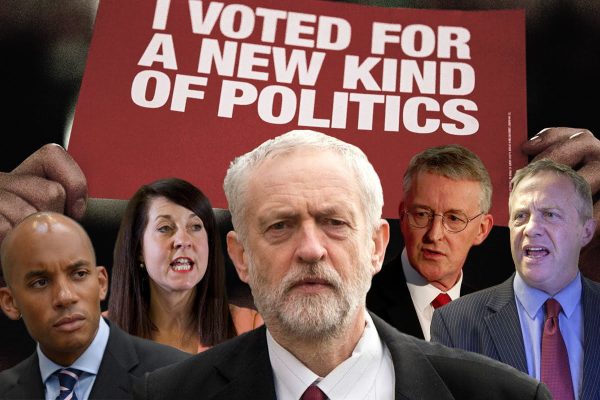
In short, the election of Corbyn as leader had opened up a civil war inside the Labour Party, between two mutually antagonistic sides. To win, the left needed to sweep out the right wing at every level of the party, by rallying rank-and-file members around clear socialist policies.
Both a shield and a sword were required: not only organisation, within local constituencies and nationally, to parry and repel the Blairites; but also a bold socialist vision that could inspire workers and youth to fight.
The importance of a class perspective not only applied to the fight against the Labour right wing, but also to the challenges that a potential Corbyn government would face. Clear socialist demands were essential both to rouse and rally activists, and to combat the ruling class’ threats of army coups and strikes of capital.
Sowing illusions in the possibility of a left Labour government successfully wielding the apparatus of the bourgeois state, or taxing the rich and regulating the capitalist system, would be fatal – as the example of the Allende government in Chile tragically demonstrates.
Political awakening
Corbyn’s election victory in September 2015 opened up the floodgates, leading hundreds of thousands to pour into the party. Constituency Labour parties (CLPs) up-and-down the country were taken over by the left. And local activist groups mushroomed, as grassroots members began to get organised, often under the newly-formed banner of ‘Momentum’.
A new generation was politically awakened. Fresh layers were being brought into activity for the first time. This was the beginning of (what we described at the time as) the ‘Corbyn Revolution’.
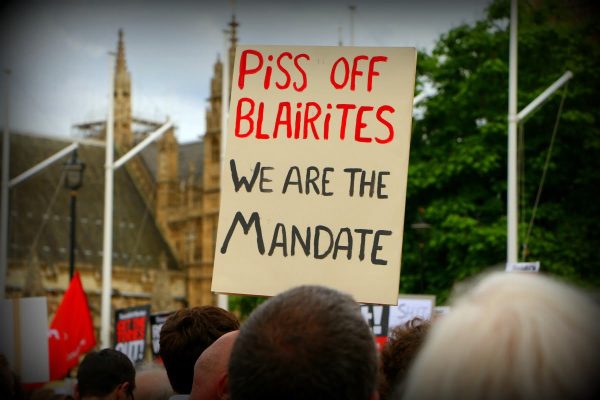
There were many twists and turns in the tale over the following years – too many to describe in detail here. But the general dynamic was clear.
Repeatedly, the radicalised and politicised masses would mobilise, seeking to support Corbyn, transform the party, and help bring a socialist Labour government to power. On every occasion, however, grassroots activists would find themselves blocked.
Of course, there was the sabotage of the Blairites. If anything, though, their intrigues and attacks only heightened the resolve and determination of the rank and file, leading growing numbers to correctly conclude that these right-wingers needed to be removed entirely.
The real barrier was the left leaders themselves.
Ruthlessness vs naivety
The left had countless opportunities to clear out the right wing, take control of the Labour Party, and transform it into a vehicle for socialist change: after Corbyn’s first leadership victory; after the Blairites attempted (‘chicken’) coup in the summer of 2016, and the subsequent second leadership contests; and after the narrow defeat of the 2017 general election.
All of these were seen as major successes: achieved against the odds; against the media’s slanders and the wrecking tactics of right-wing Labour MPs. These triumphs therefore gave the rank and file of the Corbyn movement enormous confidence.
At these key moments, if the left leaders had given the go ahead, rank-and-file members could have easily driven out the right wing, who were largely demoralised and on the back foot.
Indeed, such was the favourable balance of forces, that all this could have been achieved democratically, through the mandatory reselection of the party’s MPs – a policy that had the support of ordinary CLPs members, as evidenced at multiple Labour conferences.
Instead of seizing these opportunities to drive home their advantage, however, the left leaders around Corbyn consistently managed to clutch defeat from the jaws of victory.
While the right wing were ruthless, the left were paralysed with naivety: holding out endless olive branches to those baying for their blood; warning about ‘rocking the boat’ and splitting the party; and appealing for Labour to be a ‘broad church’, rather than an instrument for implementing genuine socialist policies.
Limits of reformism
Rather than spurring the movement on, the left ‘leaders’ actively demobilised grassroots activists.
The founders of Momentum stripped the organisation of its democratic structures and procedures, for example, due to fears that it was getting out of their control. The trade unions, meanwhile, used their bloc vote at conference to thwart rank-and-file members’ efforts to bring in the deselection of right-wing Labour MPs.
The softness of these lefts was not accidental, but a reflection of their reformist politics.
The media painted Corbyn and his advisors as militant Marxists. In fact, they were (and remain) left reformists. And like all reformists, they do not see society as divided into incompatible, conflicting classes. Nor do not believe that the working class can or should take power.
Instead, they believe that you can appeal to the capitalists and their representatives to be nicer – as reflected in Corbyn’s call for a “kinder, gentler politics”. In turn, they believe that capitalism, as an economic system, can be made to function in workers’ interests.
Consequently, the left leaders never saw the battle inside the Labour Party as a class war, but simply an unfortunate squabble, to be overcome through negotiation and compromise; ‘pragmatism’ and ‘reason’.
The inevitable outcome of this outlook was a series of capitulations and defeats, leading to demoralisation and disorientation amongst the mass base of the Corbyn movement.
Identity politics
The final coup de grace came from the establishment’s orchestrated smear campaign over ‘antisemitism’.
The ruling class discovered this weapon empirically.
Since the beginning, they had slung all manner of mud at Jeremy Corbyn, accusing the Labour leader of being – amongst other things – a ‘terrorist sympathiser, a ‘Moscow stooge’, a ‘Czech spy’, and a ‘brocialist’. But while none of these slanders stuck, trumped-up charges of antisemitism had greater potency.
At root, this is because they hit at the left’s soft underbelly: its complete acceptance of the pernicious, postmodern ideas of identity politics.
According to the creed of IDpol, one cannot challenge someone else’s subjective beliefs; their personal ‘truth’ – particularly if that person belongs to an oppressed group or minority.
The left were therefore impotent and incapacitated when confronted by the right wing’s weaponisation of ‘woke’. By taking spurious allegations of racism at face value, the reformists backed themselves into a corner.
Damaging mistakes
The only solution would have been to fight back on a class basis: refusing to accept these baseless smears; highlighting the hypocrisy and cynicism of their accusers; and explaining the capitalist and imperialist interests that lay behind the Blairites and this establishment, Zionist campaign.
With a few notable exceptions, however, all of the leading lefts buckled over this question, throwing Corbyn and his supporters under the bus.
Today, long after the damage has been done, some of these same figures acknowledge their previous mistakes. Hindsight, as they say, is 20/20.
Novara journalist Ash Sarkar, for example, has written about how the left’s adherence to identity politics was responsible for the downfall of the Corbyn movement.
Independent MP Zarah Sultana, meanwhile, has stated that Corbynism was wrong to “capitulate to the IHRA definition of antisemitism, which famously equates it with anti-Zionism”.
Others concede that the left tripped up, but then justify their missteps by saying things like: “What choice did we have?”…“the establishment and their media are too powerful”…“the left wasn’t strong enough”…and so on, and so forth.
In other words, they do not really accept responsibility for their betrayals and spinelessness, but seek to blame the masses and the supposed ‘low level of consciousness’.
Question of leadership
Such ‘explanations’ for the Corbyn movement’s defeats are false and dishonest.
Consciousness is not a static, fixed quantity, but something that can be shaped and transformed. And this is where the question of leadership comes to the fore.
At critical crossroads, the role of leadership becomes vital. At such moments, a bold lead from the top can act as a catalyst, helping to give the masses confidence in their own strength, and thereby push the movement forward.
By contrast, a lack of leadership – or worse, active obstruction or treachery – can wreck the movement, turning a favourable opportunity into a defeat, or causing a retreat to become a rout.
This was the situation that Corbyn frequently found himself in. There were many times where he could have called upon his army of activists to march and charge, and turn the tide in the battle with the Blairites. Yet this potential was repeatedly squandered.
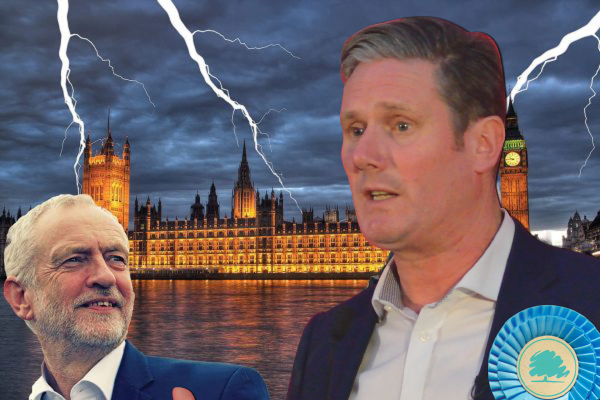
The result is the situation we find ourselves in today, where the Labour right wing has regained control, and the left has been thoroughly purged from the party.
The left reformists do not consciously pursue such a path. They may well be sincere in their aims, and mean well. But as the saying goes, the road to hell is paved with good intentions.
Fundamentally, the problem is that the reformists do not believe that society can truly be transformed; that socialism is possible; that the working class has the power and desire to overthrow capitalism.
Hence why the left leaders consistently make compromises and concede to their opponents; why they are incapable of putting up a proper fight, and seeing things through to logical conclusion; and why, as Leon Trotsky explained, betrayal is inherent within reformism.
Brexit confusion
Antisemitism accusations, and the left’s capitulation in the face of such attacks, were undoubtedly a key factor in the undoing of Corbynism round one. Arguably, however, this was not the main thing that damaged Corbyn.
Throughout this period, the question of Brexit also dominated British politics – dividing society, and in turn the left.
Unfortunately, as with every other key issue today, from the war in Ukraine, to protectionism, to right-wing populism, the left completely failed to take an independent class position when it came to the matter of Brexit and the European Union.
Historically, for the most part, the left generally had an anti-EU stance – correctly criticising the European Union for being an imperialist bloc: a capitalist club, primarily protecting the big German and French monopolies.
And this is what we, the Marxists in Britain, emphasised first and foremost in our material at the time of the 2016 referendum: our opposition to the EU on a class basis.
The question was complicated, however, by the absence of a mass workers’ campaign putting forward such a position – a rejection of the EU, and support for a Leave vote, in clear class terms.
Instead, the Brexit campaign was dominated by reactionary types like Nigel Farage and Boris Johnson.
As far as there was any left voice in this camp, it was restricted to isolated individuals like George Galloway. The trade unions and the Corbynistas mostly came out on the side of Remain.
We explained that although Brexit would be a blow against workers’ main enemy, British imperialism, who lands this punch must also be taken into account.
In other words, Brexit on a capitalist basis would be no more or less progressive than staying inside the capitalist EU, as championed by all of the liberal establishment and – unfortunately – most of the ‘left’.
Both sides of this debate were being led by reactionaries: Farage and the Brexiter Tories, in one camp, pushing for a Leave vote for racist, chauvinistic reasons; and PM David Cameron, Tony Blair, and most big businesses, in the the other, defending Brussels’ pro-capitalist, anti-worker agenda.
In this situation, there was no principled vote for socialists to rally around. Instead, the main task was to agitate for a Socialist United States of Europe, as the only real solution to the problems facing workers in Britain and across the continent.
‘Lesser evil’
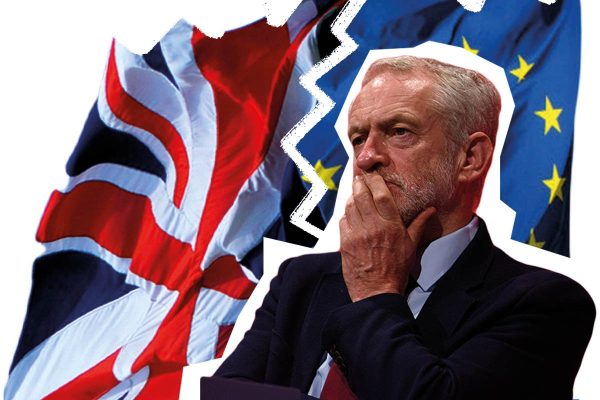
We called on Corbyn and the unions to come out boldly for such a position – that is, for a Leave vote based on a socialist and internationalist programme, involving the reversal of all austerity and privatisation, alongside widespread public ownership of the big banks and major monopolies, under workers’ control.
But, unsurprisingly, none of the left leaders adopted this stance. Instead, Corbyn initially sat on the fence. Later, he and the rest of the ‘left’ allowed themselves to be pushed by the right wing into supporting the so-called ‘lesser evil’ of Remain.
In the years following the Brexit vote, this turned into the Labour leaders offering their official backing to the demand for a second referendum – in effect, echoing and amplifying the rallying cry of the liberal elites.
In many respects, this marked the kiss of death for Corbyn and the left, and for Labour more widely.
Corbyn’s support for a second referendum was seen by disenchanted, Brexit-voting workers as a betrayal; as a capitulation to the establishment; and therefore as a sign of weakness.
Labour and its left leadership were duly punished at the 2019 general election. And Corbyn fell on his sword, mistakenly accepting full responsibility for the party’s defeat, – thereby paving the way for the return of the right wing, with Keir Starmer as their champion.
Rejection of the status quo
Looking back at these dramatic events – the Scottish independence referendum, the Corbyn movement, and the Brexit vote – we can discern a common thread connecting these phenomena.
All of these, in various ways, were a partial expression of the same anti-establishment anger, brewing and bubbling away in the bowels of society.
In the first case, this was refracted through the prism of the national question. In the second case, it found a political reflection on the left. And in the final case, it appeared as a distorted rejection of the status quo, the elites, and their institutions by working-class communities that had been ruined by capitalism.
Fast forward to today, and we see this same mood manifested both in the rise of right-wing populism, in the shape of Trump, Farage, Le Pen, the AfD, and so on; and, especially amongst the youth, in the movement for Palestine, or with the mobilisations against racism and climate change.
Likewise, we have seen the return of industrial militancy in Britain – most notably with the mass strikewave of 2022/23.
Polarisation and radicalisation
Unfortunately, many on the left have an impressionistic and empirical view of such processes.
Pointing to the growing support for Reform UK, for example, these layers offer nothing but pessimistic predictions and prognoses, talking of a qualitative ‘shift to the right’.
In fact, what we are witnessing is a sharp polarisation and fragmentation in British politics, with swings to the right and to the left.
Yes, Farage may be riding high in the polls. But the blame for this lies with the left reformists: those who failed to offer a way forward to the working class when they had the chance – and who are still failing to provide a clear socialist alternative today.
At the same time, while some voters are temporarily being drawn in by demagogues, millions are being radicalised by events, and are increasingly open to revolutionary ideas.
According to recent surveys, for example, almost a third of 18-24 year-olds in Britain have a positive view of communism. Amongst 25-34 year-olds, this figure rises to 40 percent.
View this post on Instagram
Other polls reveal that a similar percentage of young people in the UK believe that “communism is the ideal economic system”. Almost half of Gen Zs, meanwhile, think that “the entire way our society is organised must be radically changed through revolution”.
As capitalism plunges deeper into crisis, the liberals, populists, and reformists will all be put to the test, and found wanting.
In turn, large swathes of ordinary people will draw revolutionary conclusions – including many of those currently looking towards Farage and co. today.
The real question is: will the forces of communism be ready – strong enough to attract and organise these workers and youth – when this moment arrives?
Changing consciousness
The experience of the first Corbyn era shows how suddenly and sharply consciousness can change; and, in turn, why it is vital to maintain a dialectical perspective – to understand how things can, and will, transform into their opposite.
After the 2016 Brexit vote, many on the left made similarly despondent proclamations about a fundamental ‘shift to the right’ in society. The referendum result, they asserted, was simply a sign that Britain is a ‘racist country’.
Within a year, however, the same electorate had almost put Corbyn in Number 10, on a more radical programme than the ‘left’ has presented since.
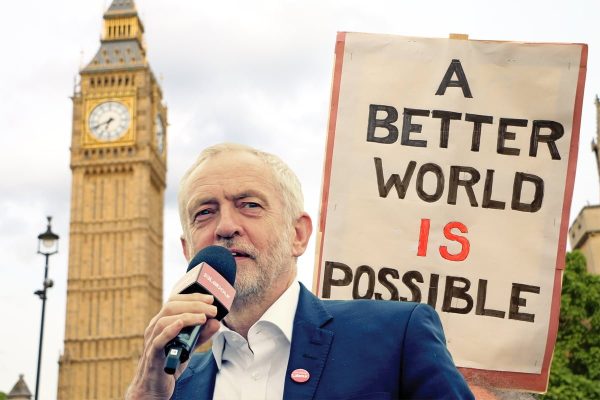
The 2017 general election saw the rise of a genuine mass socialist movement. Huge rallies occurred in cities, towns, and even villages everywhere. A ‘youthquake’ swept across the UK. Glastonbury crowds sang the left Labour leader’s name.
Corbyn came within a few thousand votes of entering Downing Street. And like with the result of the Scottish independence referendum, Labour’s narrow defeat was seen as a victory for the left.
The entire establishment was shocked and dumbfounded. The same gloomy activists who had previously (and prematurely) despaired about the death of the left, meanwhile, now found themselves swept along by a tsunami of euphoria.
Likewise, following Boris Johnson’s landslide victory in the 2019 general election, many ‘left’ commentators forecast at least another decade of Tory rule ahead. Instead, in the years that followed, Britain witnessed one crisis-ridden Conservative administration after another.
And now, Starmer’s supposed ‘supermajority’ government is being torn to pieces by the same contradictory forces that led to the downfall of Cameron, May, Johnson, Truss, and Sunak before him.
A new chapter
Far from seeing a one-way, irreversible ‘shift to the right’, the last decade of British politics has been characterised by sharp turns and sudden changes.
The Scottish independence referendum in 2014; the election of Corbyn as Labour leader in 2015; the Brexit vote in 2016; the general election result in 2017: all of these show how titanic events can emerge like a bolt from a clear blue sky.
On every occasion, such shocks served to transform the situation, leading to volatile swings in the public mood.
We can expect more of the same in the period ahead – but on a higher level. History may rhyme, but it won’t repeat itself.
In Britain and on a world scale, the last ten years has seen an enormous accumulation of contradictions and tensions in the system. Instability and uncertainty at all levels has only heightened.
We are not only witnessing an unprecedented, neverending, global economic crisis, but are living through a historic turning point for capitalism: the crumbling of the old status quo; the end of an epoch, with the collapse of the liberal postwar order; and the opening up of a new chapter.
The developments seen in Britain in the 2010s were an early anticipation of this process. Capitalism began to break at its weakest link.
The coming revolution
Importantly, however, consciousness has been shaped by the experiences of the past decade.
In Scotland, for example, many workers and youth previously drawn into the independence movement will now be looking beyond nationalism and towards revolution.
Similarly, many of those involved in Corbynism round one will have been steeled by the failures and betrayals of the left leaders in these years.
Today, they may hope to see Corbyn and Sultana’s new left party succeed. But they will also have fewer illusions in what the reformists can achieve.
For the most politically-conscious layers, understandable naivety has been replaced by a healthy scepticism and a strengthened resolve.
Given the depth and intensity of capitalism’s crisis, different leaders and parties will have less room for manoeuvre than they did in the past. And, in turn, different ideas and tendencies will be more quickly tested, challenged, and discarded.
The gap between the objective situation – the acute crisis of capitalism globally, and the radical anti-establishment mood in society – and the complete lack of the subjective factor – the political vacuum; the bankruptcy of the left; the complete dearth of ideas – will only continue to widen.
The events of the 2010s show what we can expect in such a situation: distorted and partial expressions of the burning anger in society, desperately searching for an outlet.
It is up to us, the communists, to resolve this glaring contradiction: to build a revolutionary party, armed with crystal-clear Marxist ideas and perspectives, that can offer a way out of the present impasse.
This is the task that we are embarking on: the building of an organisation of communist cadres – of class fighters who will not buckle under pressure; who can take advantage of every opportunity, skillfully and flexibly connecting with the movements of workers and youth that arise; who can become a decisive factor in the unfolding process, and lead the coming British revolution.

